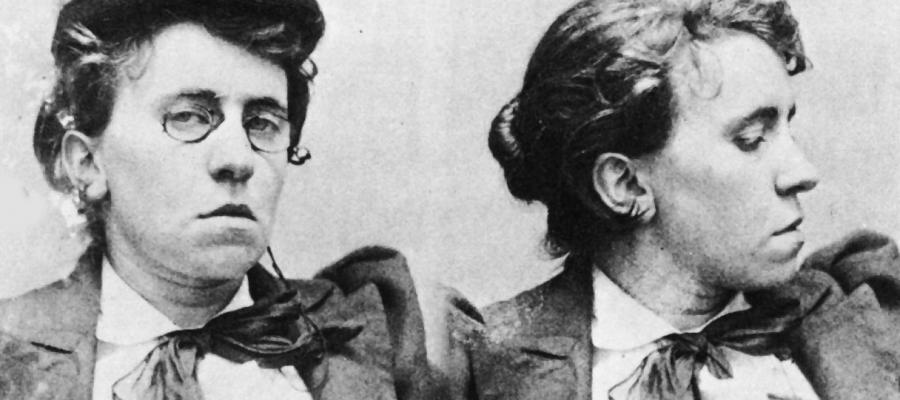Emma Goldman
Nov 17, 2024Activist and anarchist philosopher Emma Goldman fought for human liberation in every realm of life.

Emma Goldman is a fascinating—and controversial—figure. She lived in my places: from Lithuania and Latvia to New York, London, Berlin, Spain, not to mention the Soviet Union, where she was deported in 1919. J. Edgar Hoover called her “one of the most dangerous anarchists in America.”
But was that was a fair assessment? In 1892, Goldman conspired in the attempted murder of a factory owner, and years later in her autobiography she doubled down, writing that “the end justified the means.” But what she was actually for deported for was encouraging people not to sign up to fight in World War I. After all, if one opposes murder, one might agree with Goldman when she said that war is just the state murdering a lot of people.
And yet she spent a lot of time campaigning against violence: she hated war and the death penalty, and she criticized the Soviet Union at a time when many leftists were still defending it. Goldman's anarchist philosophy meant that she could not stomach state-sanctioned murder. Of course one can oppose rampant state violence without being an anarchist. But as Thomas Hobbes argued, having a state means having a military, along with judicial system that's backed up by force.
Hobbes also famously said that if we didn’t have a state, life would be nasty, brutish, and short—and Goldman would say that he was wrong. In a perfect anarchist utopia, everyone would have the chance to flourish. Anarchism doesn't mean mobs of people running around smashing things. Goldman actually calls it a kind of "order"—a natural order, emerging organically from our desire for community. As she said, “True social harmony grows naturally out of solidarity of interests.”
Of course, that soliday can also be hard to come by. We've all had that roommate who never lifts a finger, even when it's his turn to do the dishes. We don't quite threaten him with imprisonment (or worse) if he doesn’t pull his weight, but we can eventually decide to kick him out of the house. Even if anarchism isn’t perfect, it’s better than the alternative way we live now. Today's oligarchs leave us with far worse than a sink full of dirty dishes: they leave a trail of environmental destruction so they can hoard more and more wealth.
So how do you change things? Following Goldman's advice, you strike. You refuse to comply with people telling us to get drafted, or that you’t get birth control. If enough people just say "no" at the same time they can change the world. Of course many of us do say "no" every four years, at the ballot box. But Goldman wasn't moved by voting; she said “suffrage is an evil,” and that “it has only helped to enslave people.” Which is not to say that she meant it was bad to vote; rather, she meant it was bad to focus all your political energy on voting, because voting without doing other thing doesn’t change much.
And yet people who vote often do tend to do a bunch of other things too, like talk to friends and family, sign petitions, go on strike, even run for office. Goldman's opposition to voting came in the context of the debate about women’s suffrage. It wasn't that she was against giving women the vote; she thought women should have just as much a right to vote as men. She just didn’t think voting was a significant way to change anything.
Like many of Goldman's views, it's a controversial position. But our guest has been studying those views her whole life and will help us work through them—it’s Candace Falk, founding director of the Emma Goldman Papers research project.
Comments (6)
philosopher
Friday, December 6, 2024 -- 4:55 AM
She had really interestingShe had really interesting views, but to me they feel outdated
CMontesy
Sunday, December 8, 2024 -- 2:12 PM
Emma Goldman’s life and ideasEmma Goldman’s life and ideas challenge conventional views on politics and social change. Her critique of state violence, advocacy for solidarity, and skepticism of suffrage highlight her radical yet thoughtful philosophy. A fascinating figure worth exploring deeply! I read all her articles and I am still astonished by her views.
limcyrussss
Thursday, May 15, 2025 -- 6:18 AM
This is very insightful.This is very insightful. Thank you! certified arborist
KerrySBishop
Wednesday, May 21, 2025 -- 2:09 AM
Emma Goldman's exploration ofEmma Goldman's exploration of anarchist philosophy is similar to that in blocky blast where strategic thinking and collaboration lead to success, Goldman's ideas encourage us to rethink how we can together challenge unjust systems and promote a more harmonious society.
v
Wednesday, June 11, 2025 -- 9:28 PM
TV Magis is your gateway toTV Magis is your gateway to global streaming. Watch everything live with TV Magis.
candyclicker
Friday, May 23, 2025 -- 2:37 AM
Emma Goldman's life has beenEmma Goldman's life has been a whirlwind. The way she fights for what she believes in may be controversial, but she keeps going. Candy Clicker